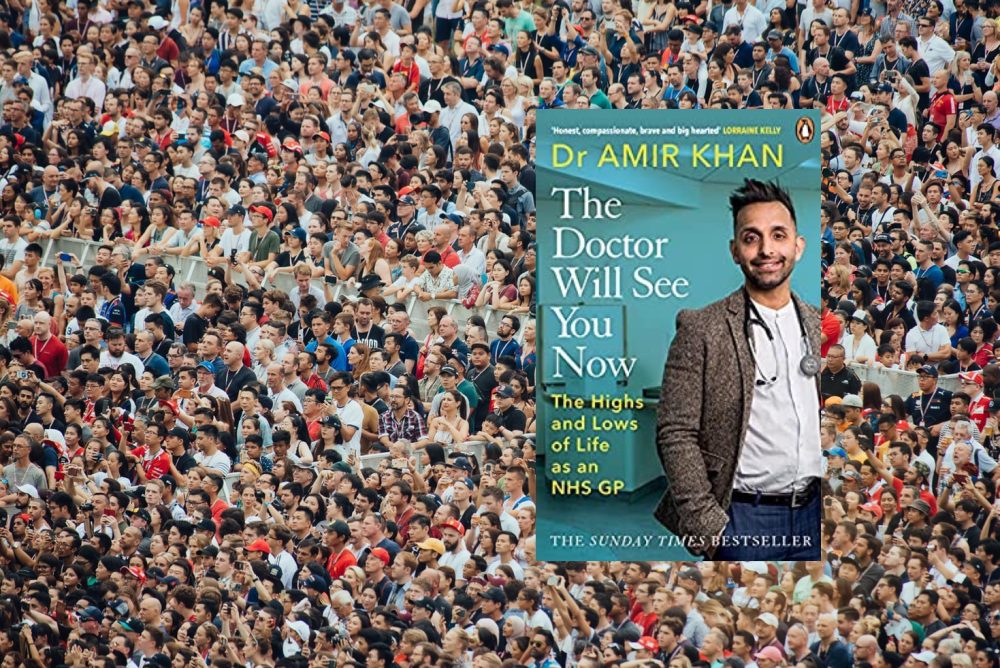 Awais Ahmad is an Associate GP in Ivy Court Surgery in rural Tenterden, Kent.
Awais Ahmad is an Associate GP in Ivy Court Surgery in rural Tenterden, Kent.
The Doctor will see you now is a book worth reading.
Dr Amir Khan deep dives into the recent headlines covered by newspapers across the country highlighting ‘’Doctors suffering a ‘wave of abuse’ over lack of face-to-face appointments’’ (telegraph) or ‘’Face-to-face GP visits still near lockdown levels’’ (BBC) and ‘’PM Boris Johnson warns NHS GPs that thousands will ‘suffer’ without face to face appointments’’ (daily mail). The intense pressure GPs are constantly facing can at times feel like a landslide ready to take us under.
The book would help any non-medical person get an in-depth view into an NHS GP’s highs and lows. The book is well written and keeps the reader engaged from start to finish. As a GP myself, I struggle with time for my own hobbies let alone reading things other than patient notes. I believe though if I had, had the time I would have finished this book in a day. The book reveals the human and often overlooked side of a GPs work which can be deeply emotional & involve psychological stresses for both the GP and the patients he is dealing with. Dr Khan explains and relates these interactions powerfully.
….genuinely connected to the well-being of his patients … as individuals and not just a sea of numbers.
Busy GP’s may have the best intentions for their patients but following through on these is usually difficult and at times almost impossible. I did feel that certain interactions seemed somewhat exaggerated to keep the reader engrossed but that doesn’t mean they weren’t real. How we all deal with our patients can be a very individual, occasionally rewarding and very focused effort. Dr Khan paints a colourful and often enlightening picture across the myriad of patients he sees.
He reminds us how “as GP’s we can become almost robotic with our gruelling schedules of endless thankless tasks”, but there is a dim light at the end of the tunnel. Unexpected gifts and thank you cards out of the blue. The fact that patients would take the time out to thank us always feels like a huge win. It is a much-needed boost of morale and appreciation.
He highlights how GPs, swallowed up by their busy lives, use that as an excuse for not getting help for themselves. This did worry me and made me realise how paramount taking care of our own well-being is becoming. The pressure on GPs can be all consuming but we must not forget the greater good of which we are a part, and how prioritising and making time for what is important to us personally is crucial to our mental health.
He talks about what keeps him going as a GP and his examples were relatable and eye opening. He took time out to console a mother when she lost her child. He feels the responsibility and at times the heavy burden of the continuity of care he must provide for his patients that with old age are dying and need him more than ever.
He feels the responsibility and … the heavy burden of the continuity of care.
I sometimes feel the fact that we as teams and GPs on our own save lives on a daily basis is something that the media conveniently forgets when it does choose to report on us. We need to remind ourselves that in our own small ways we are heroes. I don’t mean to blow my own trumpet here but when the masses don’t, we sometimes need to do it ourselves.
Then the pandemic hit and engulfed everything. How we consult; how we interact and communicate with patients; colleagues, family and friends everything drastically changed. Dr Khan emphases the effects of the pandemic on the workload and pressures faced by GP practices. He, like most of us, hopes that policy makers listen to GPs and bring about realistic changes. We need practical solutions to evident problems and not just false promises of change. An outdated system is being pushed to its limit and the after affects will be far reaching.
Featured book
Khan A. The Doctor Will See You Now: The highs and lows of my life as an NHS GP. Ebury Digital, 2020. ASIN: B088PGF8Y4
Featured image by Chuttersnap at Unsplash







I have finally got around to reading this book and found your review was indeed almost spot on. You did a good job of summarising the key points of the book review in a concise manner. You also provided your own perspective as a GP. You presented the author’s opinions and observations in a clear and objective manner, without excessive personal bias. I agree the stories seem relatable and the possibility of some interactions being exaggerated for dramatic effect.
You could have provided more specific examples or quotes from the book to support their points. This would have added more depth and specificity to this review.
With some additional details and analysis, this review would be even stronger.
I have read this review and was motivated o read this book. After reading it, I found it very interesting and thorough in it’s field. Thank you Dr. Awais, you have shown a great perspective of the book from the same field and have made it an interesting curious read.